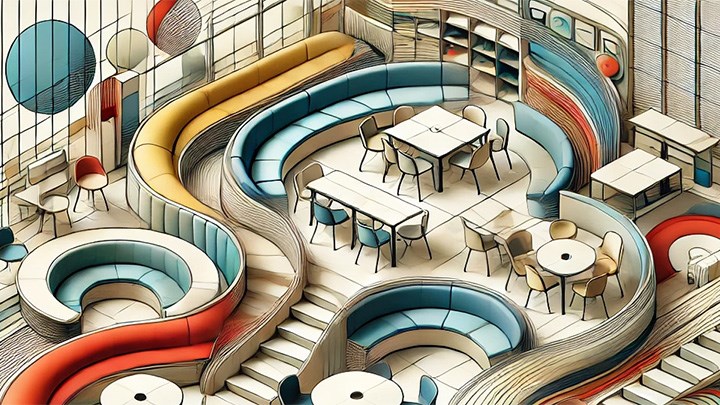Learning environments

Örebro University is committed to developing learning environments that stimulate active learning, creativity, reflection, education, and that promote openness and dialogue between different perspectives. This page contains texts that explain basic concepts related to learning environments and resources that can be used by teachers and students in their work to design learning environments for different types of learning activities.
Key concepts
The learning environment is formed through the interplay between the pedagogical dimension, the social dimension, and the spatial dimension The interplay between these three dimensions needs to be based on conscious reflection that answers didactic questions such as: Where? For whom? What? How? Why? By whom/which roles?
Learning activity refers to different types of activities that are carried out, such as lectures, seminars, workshops, laboratory sessions, supervision, skills training, and work-based training (VFU, placement) and own work.
Lecture refers to activities where the teacher plays an active role in conveying content to the students.
Seminar refers to activities that involve students through dialogue between different participants (both teachers and students).
Workshop refers to activities that focus on co-creating knowledge where participants (both teachers and students), for example, contribute, test, develop their own solutions and work with different tools to solve different problems.
Laboratory session refers to activities where students plan, carry out, document, and reflect on both theoretical and practical elements.
Supervision refers to activities where the teacher meets with one or a small group of students to discuss student work based on the students' questions.
Skills training refers to activities where students practise practical skills with the teacher present as support.
Educational environment refers to different types of learning, such as campus learning, digital learning, synchronous hybrid learning and asynchronous hybrid learning.
Learning Lab: Educational test environment designed for learning more about how space, pedagogy and technology can be used in the development of future learning environments and contribute to academic development in higher education.
Learning environment development at Örebro University is based on a sub-project in the Teacher education for tomorrow initiative. The aim of the sub-project was to develop the university's learning environments to offer challenging education in stimulating learning environments and to enable the creation of high-quality and innovative educational content that meets future competence needs.
Learning environments may spontaneously be associated with different types of rooms and spatial conditions (physical, virtual and/or digital). However, a starting point in the work to develop learning environments at Örebro University has been the definition that a learning environment refers to the interaction between a pedagogical dimension (which answers the didactic questions: What? How? Why? and By whom?), a social dimension (For whom?) and a spatial dimension (Where?). With this as a foundation, the learning environment becomes more than just a room/space. The learning environment is designed by the teacher (and students) by factoring in all three dimensions.
The interplay between the pedagogical dimension, the social dimension and the spatial dimension needs to be based on conscious reflection that answers didactic questions such as: What? How? Why? By whom? For whom? and Where?
In the process of developing learning environments at Örebro University, resources in the form of room and activity diagrams and a reflection document have been created. These can be used by teachers (and students) when designing different types of learning activities in different types of educational environments. These two resources can serve as support for teachers when teaching in physical, hybrid and digital educational environments.
For further development in the area, Örebro University and Akademiska Hus have signed a collaboration agreement for regarding a Learning Lab with the aim of learning more about how space, pedagogy and technology can be used in the work of developing the learning environments of the future in new construction and renovation projects. The agreement runs through December 2025. If you as a teacher want to organise teaching in the Learning Lab, you can find more information about and book the Learning Lab here. When you conduct teaching in the Learning Lab, you have access to both technological and pedagogical support in the form of a member of the Learning Lab team. This means that teachers can get help in planning, choosing technology and arranging the room in a way that supports the learning activity to be carried out.

